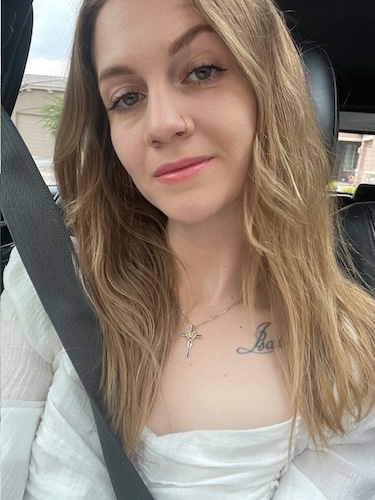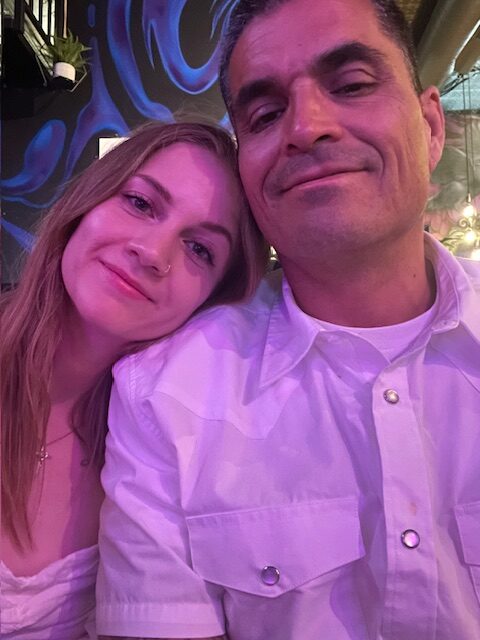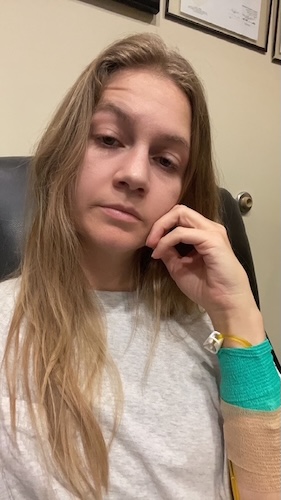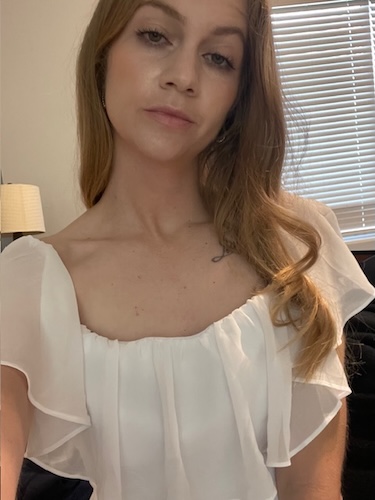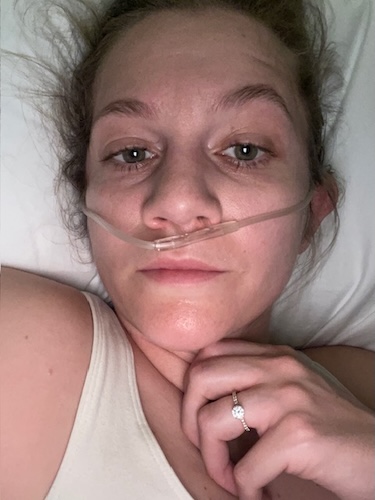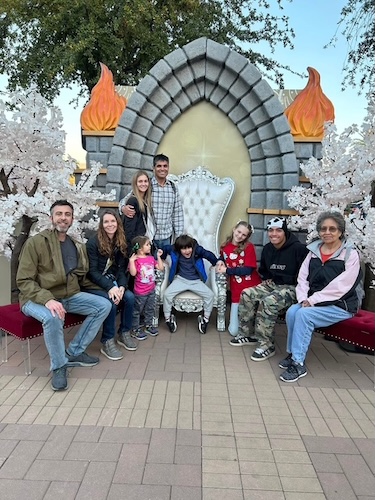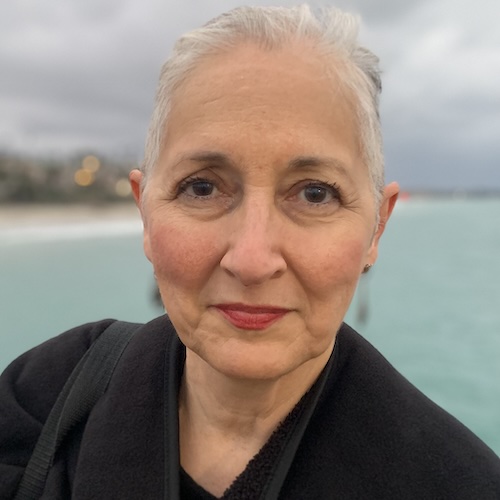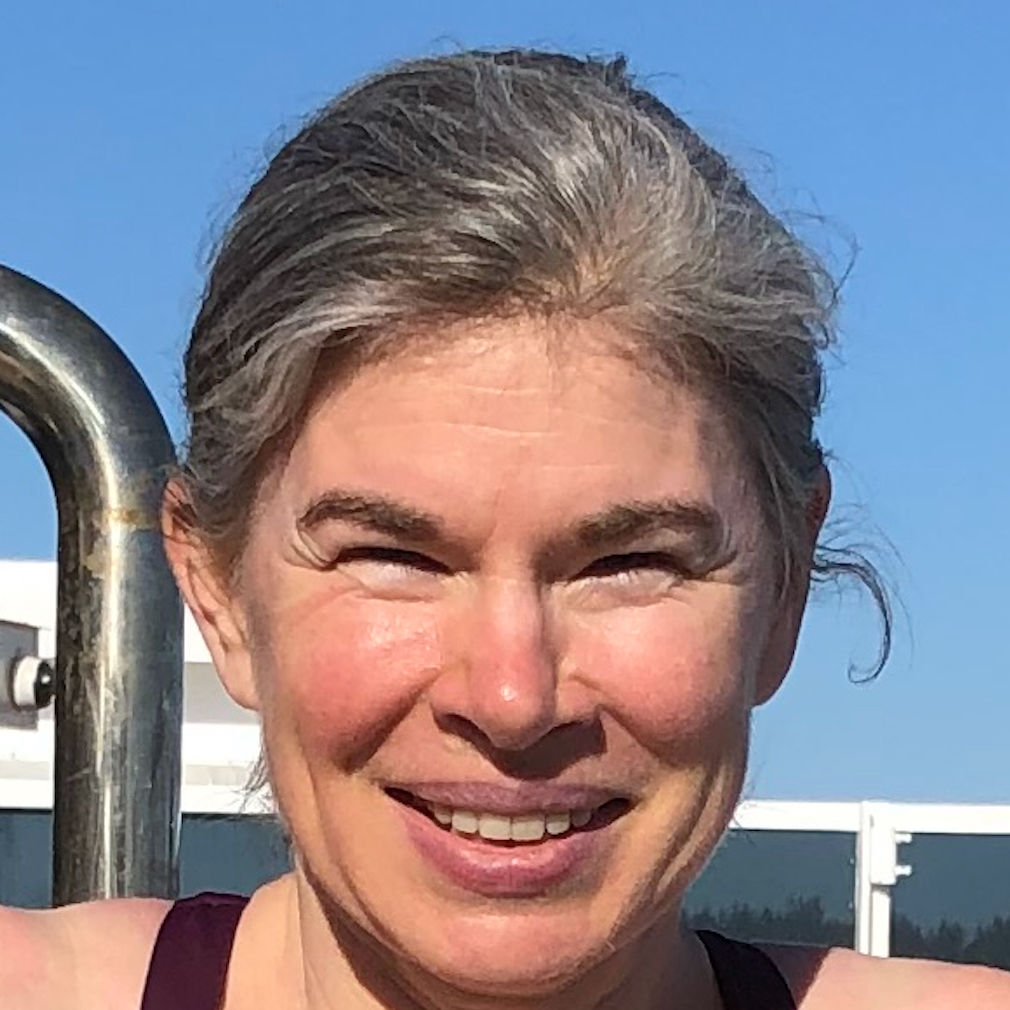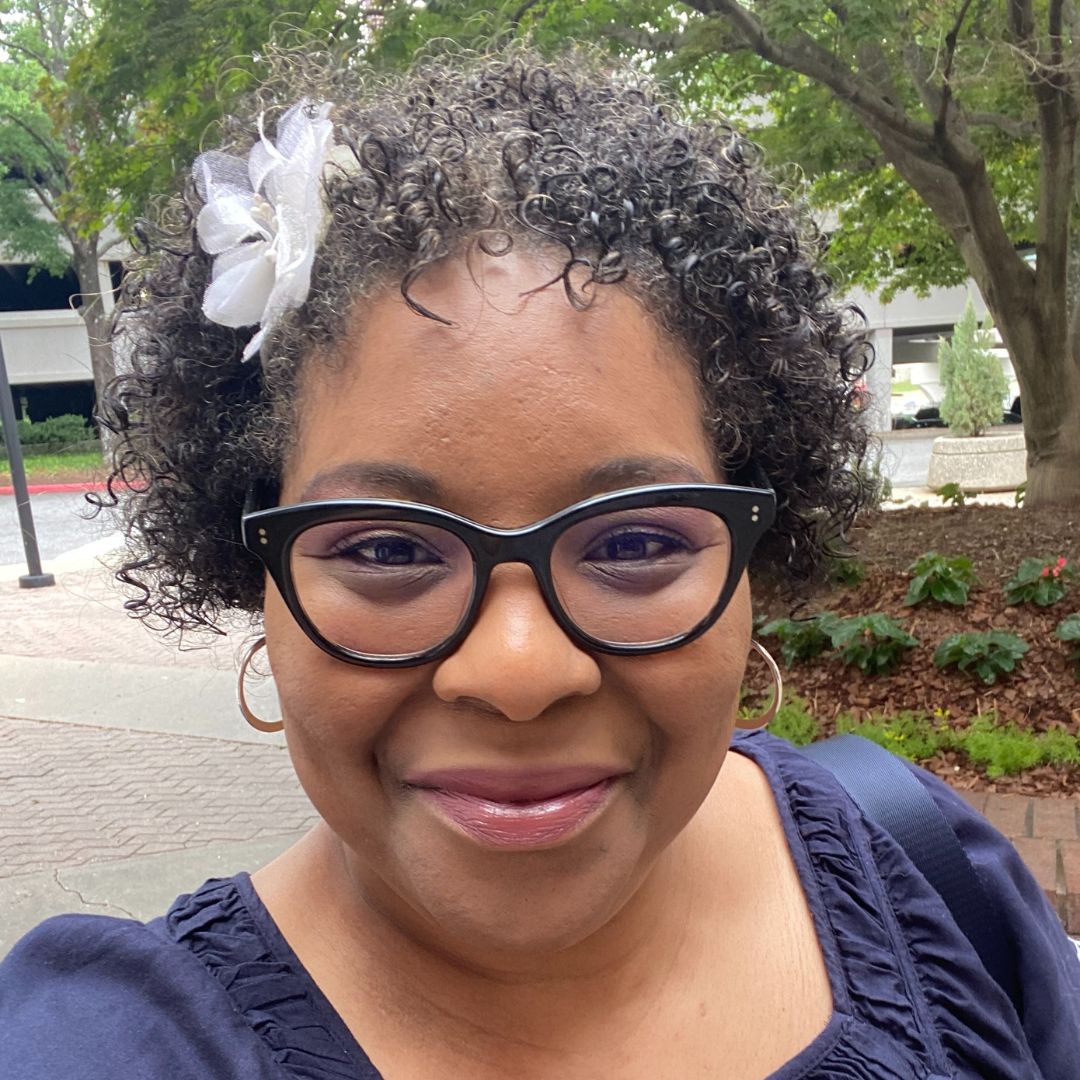Finding Comfort: How Marissa Navigates Stage 4 BRCA2+ ILC Breast Cancer
This is Marissa’s experience with stage 4 breast cancer. She first noticed that something was wrong when she felt unusually tired, had restless legs leading to sudden painful cramps, and experienced hot flashes at night. Like any busy mom with two little kids, she brushed these symptoms off at first, until a lump in her right breast prompted her to see her doctor. After multiple scans and a biopsy, Marissa learned she had stage 2 invasive lobular carcinoma and carried the BRCA2 gene.
Interviewed by: Nikki Murphy
Edited by: Chris Sanchez
At just 31, with a young family and a recent move, Marissa felt overwhelmed. She found it complicated and challenging to transition into treatment; traditional options like chemotherapy and radiation scared her, especially with all the potential side effects. Initially, she chose integrative care, hoping to support her body naturally. But nine months later, scans showed that the breast cancer had spread to her bones, elevating her to stage 4. This became a turning point; she began hormone therapy and low-dose chemo, and she saw her breast tumors shrink. Looking back, she openly shares the regret of delaying certain treatments, but she also stresses how vital it is to feel comfortable and supported in your care decisions.
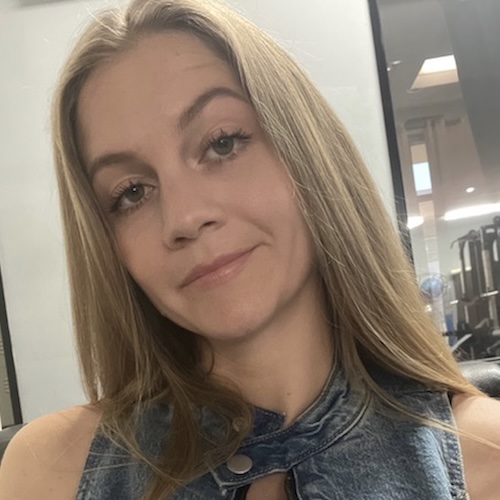
Through it all, family has been Marissa’s anchor. Her mom and stepdad even moved states to help with childcare, homeschooling, and daily life, allowing her to focus on her health. Being a mom with cancer comes with heartbreaking worries, which she tries to counter by writing letters and recording her voice for her kids, but it also inspires her to cherish every moment with them. She admits some days are tough with bone aches, fatigue, and migraines, but other days are filled with laughter and gratitude.
Marissa wants others to know that metastatic breast cancer isn’t simple. Treatments work differently for everyone, and emotional support is just as important as medical care. She encourages anyone navigating a diagnosis to seek multiple opinions and choose the path that gives them peace. Comfort, whether from family, a supportive medical team, or a healing space, makes a world of difference.
Watch Marissa’s video and scroll down for the transcript of her interview to delve into:
- A young mom’s journey from worrisome symptoms to a life-changing diagnosis
- How one woman balances motherhood and metastatic breast cancer with grace
- The emotional turning point that shifted Marissa’s treatment approach
- Why comfort and community became her lifeline through stage 4 breast cancer
- Marissa’s honest reflections on regret, resilience, and cherishing every moment
- Name: Marissa T.
- Diagnosis:
- BRCA2+ ILC (Invasive Lobular Carcinoma) Breast Cancer
- Age at Diagnosis:
- 31
- Staging:
- Initially stage 2, progressed to stage 4
- Symptoms:
- Appearance of lump in right breast
- Significant fatigue
- Hot flashes at night
- Leg restlessness leading to sudden, unexpected leg muscle cramps
- Treatments:
- Chemotherapy
- Hormone therapy
- PARP inhibitor
- Integrative medicine
This interview has been edited for clarity and length. This is not medical advice. Please consult with your healthcare provider to make informed treatment decisions.
The views and opinions expressed in this interview do not necessarily reflect those of The Patient Story.
- My name is Marissa
- When I first noticed something was wrong
- Genetic testing revealed that I have the BRCA2 gene
- My treatment options were limited, so I pursued integrative care
- I got a scan 9 months later. The cancer had spread
- How I’m handling the side effects of chemo
- The hardest challenge I’m facing
- My diagnosis saved my marriage
- What people don’t understand about stage 4 breast cancer
- My advice to others
My name is Marissa
I was diagnosed with invasive lobular carcinoma breast cancer last year. Which would have been February 17th, 2024.
When I first noticed something was wrong
I felt very fatigued, and I was getting hot flashes at night. My legs were restless all the time, so bad that I would pull a muscle. Just giving myself Charley horses at night. I didn’t really think too much of it. I had two small children, and I just thought this was normal. You know, being a mom of little kids and not sleeping well and all those things.
But what really topped it off was that I felt a lump in my right breast, and I had asked my husband to feel it. And he did. I said, “Does this feel normal? And he said, “No, you need to go get that checked out.”
So I went to my primary care physician, and she did a physical exam, which led to a mammogram and ultrasound. I did three of those in one visit. So it was a lot of back and forth. They had a really hard time just realizing what they were looking at. So they decided it would be better for me to get a biopsy done just to confirm if anything was going on.
So I did the biopsy a few days after my mammogram and ultrasound. The biopsy confirmed that it was a stage 2 invasive lobular carcinoma in my right breast. And then I also had some lymph nodes that tested positive as well.
Genetic testing revealed that I have the BRCA2 gene
This is how I found out that I had cancer.
My primary care physician called me on the night of February 17th. I’ll never forget it. She said, “I got your results back. It looks like you have breast cancer. But it looks like it’s in an early stage. So we’re going to set an appointment with an oncologist and a surgeon, and they’ll go over all of your testing with you.”
I set that appointment, and it was a three-hour-long appointment. They went over my diagnosis and the treatment plan that they had for me, which was a double mastectomy if I carried a gene for breast cancer.
My treatment options were limited, so I pursued integrative care
They were skeptical of chemo because lobular carcinoma doesn’t really respond to chemo. So it would have just been hormone therapy, surgery, and radiation. And that would have been the best plan for me.
But I felt very nervous about it at the time. I was 31 years old. My kids were still really young, and we had actually just moved here from Michigan about a year and a half before all of this happened. We were just getting settled into our new life in Arizona, adjusting to everything.
I wanted to do some research to see if there was any approach that I would be more comfortable with. But then, it was as effective to look for other options and get a second opinion from other clinics. So that’s what I did. And I found the clinic that I’m going to. It’s integrative.
I declined all the treatments that I was given because I was just very scared of the side effects from the hormone blockers, including risking osteoporosis and damaging my bones. Because I know that those are potential side effects. I was also scared of the chemo and the radiation. You know, when you do research, you read a lot, and you hear a lot of bad things. It made me really nervous to do those things.
But I also had a very rare situation happen. My BRCA2 gene mutated seven times inside my body, and those genes were resistant to one of the medications I was on. I was on a PARP inhibitor. It’s for BRCA2 and HER2-negative subtypes. So I was on that medicine for about four months before my BRCA2 gene mutated. And basically, the drug was useless at that point.
I got a scan 9 months later. The cancer had spread
The scan showed progression into my bones, which put me at stage 4. I feel like this had happened because I was just super stubborn. I was determined to heal my body without hormone therapy and chemo, radiation. I do regret not starting the hormone therapy much sooner. Had I done that, I probably wouldn’t have gotten to stage 4. Essentially, once I hit stage 4, I decided that I needed to go on the hormone blockers. And as soon as I got on the hormone blockers, a month later, my breast tumors were gone. And I just had the bone metastasis and the lymph nodes to worry about. Had I done hormone blockers sooner, it probably wouldn’t have spread to the bones. I do regret that.
So after that, I started a low-dose oral chemotherapy. And we are hoping it will do something with the bones. It’s a low dose, so hopefully it doesn’t damage my good cells, and it will be enough to wipe out the cancer cells. But it’s just an experiment, because we know that lobular carcinoma doesn’t really respond to chemo. We decided to give it a chance. And I have been on that since March this year.
So I have been on this treatment regimen for a while now, and I feel overall great. It’s just been a challenge trying to figure out what is going to get to my bones now.
How I’m handling the side effects of chemo
I feel like the most I’ve experienced is fatigue. And I try to counter this by taking vitamins. Lots of vitamins that my body needs. I drink extra water, electrolytes, and minerals. I also exercise every day just to keep my body and bones strong.
I think the most side effects I get are from the hormone blockers. Just being in early menopause, dealing with the hot flashes, and, it’s embarrassing to say, but your sweat smells way different when your hormones are blocked, and it’s not pleasant. So I shower multiple times a day and change my clothes often. I had to buy a neck fan just to help keep myself cool. And my bones ache extra from the hormone blockers.
The hardest challenge I’m facing
That’s getting through the day with the aches and the pains in my bones and fighting migraines that I get due to some lesions in my skull. Being a mom becomes a little bit more challenging when you’re experiencing pain. It’s hard to be super patient all the time and have energy to keep up with my kids all the time. But I do the best I can. I go with the flow every day.
Some days are better than others. I’m managing with the help of my mom and my stepdad. They sold their house and moved here from Michigan seven months ago. My stepdad got a job, and my mom doesn’t work. She takes care of my kids all day while my husband works. He’s just started truck driving, so he’s gone a lot. Unfortunately, it was very hard for him to work when I was gone for treatment, and it really did put a huge financial strain on our family for a while. We lost two vehicles, and we were just trying to figure out how we’re going to juggle everything. With him earning just one income, it was just about enough until you add medical expenses and me not being able to work. So, extra expenses on top of not having an income were very hard.
My mom teaches the kids while I’m not able to school them right now. She was a preschool teacher for a long time. So it’s right up her alley. She’s been my rock through it all. She cleans and she helps prep meals, and watches the kids, too. And now my husband’s able to work because she’s able to be with the kids every day.
It’s been a big blessing to our family to have my mom around. I wouldn’t be able to do this without her here.
My diagnosis saved my marriage
I feel like there was a lot of stress moving to a new state. Being a mom with little kids and my husband working added extra stress. I didn’t have any family out here, so I feel like with all the emotions we were going through, I think we hit a hard point in our relationship, trying to figure out how we can have time for ourselves and spend more time together.
I feel like when I got diagnosed, my husband and I had a realization that you can’t plan anything. Life can come to an end anytime for anybody, with or without disease. It’s precious to just value your family and make memories with them. I’ve learned that everything that I do with my family makes memories for them. And I cherish everything that I do with them so much more now than I ever have.
The way that I look at life is completely different, and my husband feels the same way. I feel more appreciated. It was a big eye-opener for both of us. It really did save our relationship.
What people don’t understand about stage 4 breast cancer
It’s not just, “Okay, you do this, do that, and you’re good. It’s done.” It doesn’t happen like that.
Everybody’s bodies react differently. There’s so much to learn scientifically about what goes on in our bodies. Sometimes our bodies don’t cooperate with meds, and then we run out of options. I mean, there’s only so many lines of treatment that we can utilize before we don’t have anything left.
I realized that it’s very difficult physically and emotionally. Just the fear of the unknown, not knowing what’s going on inside you all the time, and fearing all the what-ifs. What if it’s spreading? What if I don’t respond well to the treatment? And what if I’m not going to be around much longer?
I’ve had those thoughts myself before I got more confident and comfortable with my medical team. I wrote letters to my children because I didn’t know how long I was going to be around. I did build-a-bears with my voice recorded in them because I wanted them to have my voice, and I made them blankets because I just felt like I wanted them to be able to have something special that I made them.
I have faced so many emotional obstacles. My kids are everything to me, and I dedicate all my time to raising them, providing for them. I cherish that more than anything. I love being a mom, and my kids mean everything to me. So the thought of just me disappearing out of their lives really ripped me apart.
I think that a lot of people really don’t know much about cancer. It’s hard for them to sympathize with patients because they just don’t know what it’s really like unless they’ve been around people with it or they’re going through it themselves. I just think that the way many people think of cancer is that you just can do chemo and surgery, and you should be okay. Those things are so hard on your body, too.
It’s hard to get through the days when you feel so tired and you’re in pain. Sometimes, you feel like you’re a burden on the people around you.
My advice to others
Get multiple opinions and do whatever you feel in your gut or in your heart that you’re going to have the most peace with and feel the most comfortable. Wherever you feel comfortable is probably where you should be.
I feel like if I were in a place where I didn’t feel comforted or I didn’t have people who were there supporting me, it would not be a place I would want to be in. That’s very important for recovery and healing: the comfort that people bring you, the peace of mind that your medical team brings you if they’re there to support you, determined to help you recover.

Inspired by Marissa's story?
Share your story, too!
More ILC Breast Cancer Stories
Marissa T., ILC, Stage 4, BRCA2+
Symptoms: Appearance of lump in right breast, significant fatigue, hot flashes at night, leg restlessness leading to sudden, unexpected leg muscle cramps
Treatments: Chemotherapy, hormone therapy, PARP inhibitor, integrative medicine
Nikoo M., ILC, Stage 4 (Metastatic)
Symptoms: Gastrointestinal issues, food sensitivities, nausea
Treatments: Targeted therapy, hormone therapy
Kathleen M., ILC
Symptoms: Bloody nipple discharge, appearance of “shadow” during breast ultrasound
Treatments: Surgery (mastectomy), hormone therapy
